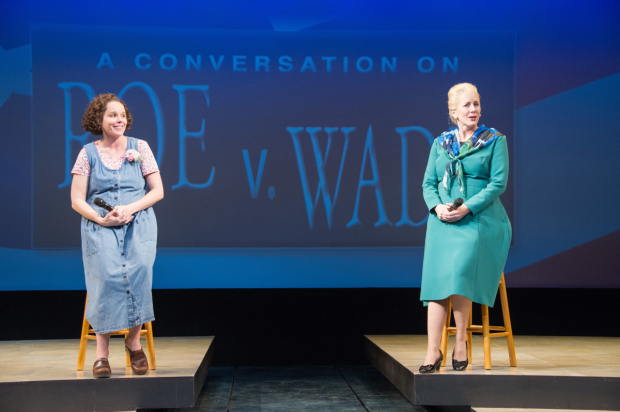Roe

(© C. Stanley Photography)
Roe, at Arena stage, marks the regional premiere of the company's current coproduction with the Oregon Shakespeare Festival and Berkeley Repertory Theatre. The play, by Lisa Loomer, refers to the 1973 landmark Supreme Court case that established abortion rights.
The play comprises a series of scenes that explain how the law evolved to where it is today regarding the fight for abortion. Our entry point opens with the introduction of two women: Sarah Weddington and Norma McCorvey. Twenty-four-year-old Weddington is the lawyer who in two years will argue the pro-choice side of Roe v. Wade before the Supreme Court. McCorvey is a working class, heavy-drinking, drug-loving bartender who – to protect her identity — becomes the "Jane Roe" of Weddington's suit.
Roe first looks at McCorvey in her native habitat: a lesbian bar in Texas where she reveals to a friend that she is pregnant for the third time and begs the friend for the name of a safe abortionist. Above all, McCorvey doesn't want to bear her child and have it taken away by her mother, which has happened once before. The focus then shifts to a 1960s consciousness-raising session, where a group of Texas women try to convince Weddington to argue a pro-choice case in Texas.
Eventually, Weddington agrees and begins to focus on what needs to be done to win the case. She and a friend of hers from law school, Linda Coffee, begin to meet with McCorvey and strategize their position. It becomes clear from the meetings that there is a great divide between the women: Weddington and Coffee want to do something to help all women; McCorvey is just looking out for herself.
After Weddington takes the case to court in Texas, director Bill Rauch picks up the pace and lets the play explode in terms of timing, showing how decade by decade Roe v. Wade was seen differently depending on who was in the White House and who was on the Supreme Court.
Sarah Jane Agnew is marvelous as Weddington. At the beginning of the play, she clearly transmits her insecurity about trying such an important case without having the requisite experience. Gradually, Agnew shows Weddington gaining the confidence she needs to face the Supreme Court. Sara Bruner is delightful as the superficial, foulmouthed McCorvey, who has never forgiven her obnoxious mother for taking her last child and who never fully understood how important her case was to so many other women.
Ten women play 27 roles. Among them, Catherine Castellanos is superb as Connie Gonzalez, Norma's partner, who truly loves McCorvey but whom Norma never appreciates. Susan Lynskey is equally fine as Linda Coffee who, at the end of the Texas trial, announces that, "according to Wikipedia," her role in history is now over. Jim Abele and Mark Bedard serve ably in three roles apiece. Richard Elmore appears as both Henry Wade and Justice Blackmun. Kenya Alexander is excellent when she appears at the end of the play, as a young, pregnant girl wondering to whom she can turn for advice.
Rachel Hauck's set is spare. At first, nine black leather chairs are seen above a series of marble stairs. Later those stairs become the place where Weddington appears when she goes to court. Later, they become the home base for Flip Benham of the antiabortion Operation Rescue. Eventually they become the locus for a bank of microphones when Gloris Allred introduces McCorvey to the press.
When the 1970s arrive, so does a burst of color and style in the costumes by Raquel Barreto and wigs by Devon Ash. As the '70s morph into the '80s and eventually into the present, black-clad stagehands bring out new costumes, wigs, shoes, and accessories appropriate to the decade.
Although a number of scenes take place in courtrooms, this is by no means a conventional courtroom drama. As it moves from a bar to a living room to a pizza parlor and even to a church, Roe dramatizes how essential the question of abortion is to many women and men of various political and religious persuasions. With its use of Wendall Harrington's projections and various quotes from judges across time, its rich and frequent humor, its ability to treat both sides of the abortion issue sensitively, Roe precisely illustrates the fractured and fracturing history of one of the most polarizing social issues of the modern era.











